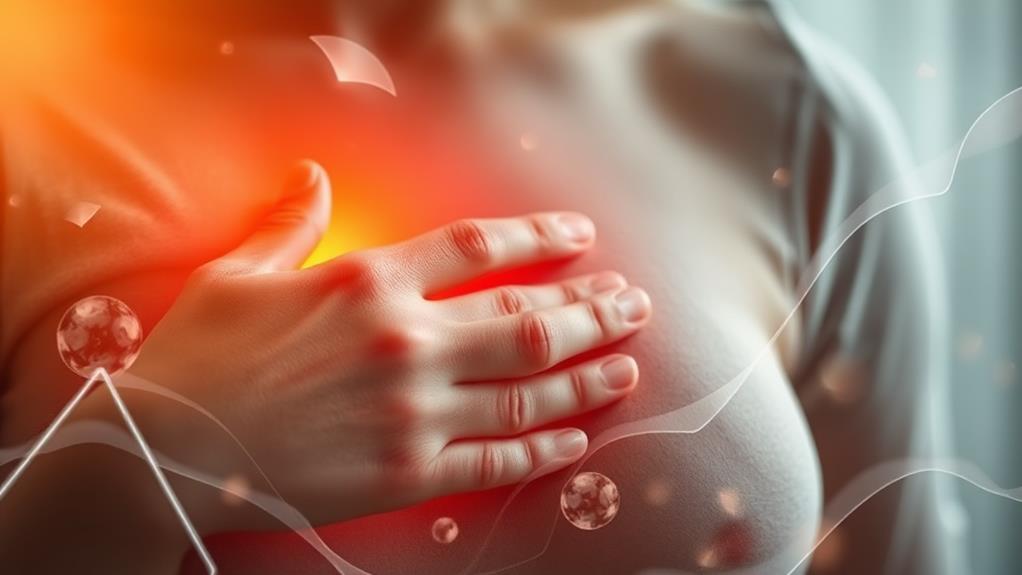You might be surprised to learn that breast pain can stem from a variety of causes, each with its own implications. Hormonal changes often play a significant role, especially if you notice tenderness around your menstrual cycle. You could also encounter discomfort from breast cysts or fibrocystic changes, which can feel lumpy and heavy. Then, there are infections like mastitis that can cause alarming symptoms. Lastly, trauma or injury can lead to sharp pain. Understanding these reasons is crucial, but there's more to consider before jumping to conclusions about your own experience.
Key Takeaways
- Hormonal changes during the menstrual cycle can cause breast tenderness and swelling, especially before menstruation begins.
- Breast cysts, which are fluid-filled sacs, often develop due to hormonal fluctuations and may cause discomfort.
- Fibrocystic breast changes result in lumpy or tender areas in breast tissue, commonly linked to hormonal shifts around menstruation.
- Infections or inflammation, such as mastitis, can lead to significant breast pain, accompanied by redness and swelling.
- Trauma or injury to the breast can cause pain and inflammation, often requiring rest and medical evaluation if persistent.
Hormonal Changes

Many women experience breast pain due to hormonal changes throughout their menstrual cycle. It's kinda like your body's way of reminding you that it's working hard behind the scenes!
When your menstrual cycle kicks off, hormones like estrogen and progesterone fluctuate, causing your breast tissue to swell and feel tender. You might notice this discomfort more right before your period starts.
It's totally normal to feel a little achy or sensitive. Think of it as your body getting ready for a potential pregnancy, even if that's not the plan! Sometimes, you may even find your breasts feeling heavier or fuller.
While the pain can be annoying, it usually goes away once your period starts. If you notice that the pain sticks around longer than usual, it's a good idea to chat with your doctor. They can help you figure out what's going on.
In the meantime, wearing a supportive bra, staying active, and managing stress can make a difference.
Breast Cysts
Experiencing breast pain can sometimes stem from the presence of breast cysts, which are fluid-filled sacs that develop in the breast tissue. Think of them as little balloons filled with liquid. You might feel a lump or tenderness when you touch your breast. These cysts can vary in size—some are tiny, while others can be as big as a golf ball!
Breast cysts are quite common, especially for women in their 30s and 40s. They can pop up due to hormonal changes in your body, and while they might cause discomfort, they're usually harmless.
If you notice any changes, like sudden pain or a new lump, it's always a good idea to chat with your doctor. They can help determine what's going on and reassure you.
Don't worry too much; most breast cysts go away on their own and don't require treatment. However, if they start bothering you, your doctor might recommend draining them.
Just remember, your breasts can be a little quirky sometimes, and that's totally okay! Keeping an eye on your health is key, so stay informed and feel empowered!
Fibrocystic Breast Changes

After discussing breast cysts, it's important to mention fibrocystic breast changes, a common condition that can also lead to breast pain.
If you've ever felt lumpy or tender areas in your breasts, you might be experiencing this. Fibrocystic changes are usually nothing to worry about. They happen when the breast tissue becomes more lumpy and can feel a bit bumpy or sore, especially before your period.
You might notice that your breasts feel heavier or fuller during specific times of the month, like a secret surprise party you didn't ask for! These changes are caused by hormonal fluctuations, and they can make your breasts feel tender or achy.
The good news is that fibrocystic changes are quite normal and affect many women. You don't need to panic if you feel these changes; just keep track of how you feel.
If the pain gets worse or you spot any unusual changes, it's a good idea to chat with your doctor. They can help you figure out what's going on.
Infections or Inflammation
When it comes to breast pain, infections and inflammation can be significant culprits. You mightn't think about it, but your breasts can get infections just like any other part of your body. For instance, mastitis is an infection that often happens in breastfeeding women, causing swelling, redness, and, of course, pain. It's like your breasts are throwing a tantrum!
Inflammation can also happen due to various reasons, like an allergic reaction or even a blocked milk duct. This can lead to tenderness and discomfort. You might feel a bit of warmth or notice some swelling, which can make you wonder what's going on.
If you notice any unusual symptoms, like fever or a change in color, it's important to talk to a doctor. They can help you find out if it's an infection or something else entirely.
Don't worry; many infections can be treated easily with antibiotics or other medications. Just remember, your body is pretty good at telling you when something's off, so pay attention! Taking care of your health is key to feeling your best.
Trauma or Injury

Trauma or injury can lead to unexpected breast pain, and it's more common than you might think.
Maybe you bumped into something while rushing around, or perhaps you'd a little too much fun playing sports. Those incidents can cause bruises or strains, and yes, they can hurt!
When you experience trauma, your breast tissue might get inflamed, causing discomfort or pain. Sometimes, you might even feel a sharp twinge if the injury is more severe.
Don't panic! Most of the time, this pain goes away on its own with a little rest and care. Applying ice to the area can help reduce swelling, and over-the-counter pain relievers can ease the discomfort.
However, if the pain sticks around or gets worse, it's a good idea to see a doctor. They can check for any serious injuries, like fractures or tears, that you mightn't notice right away.
Remember, your body's talking to you, so listen up! Taking care of any trauma early can prevent bigger issues later.
